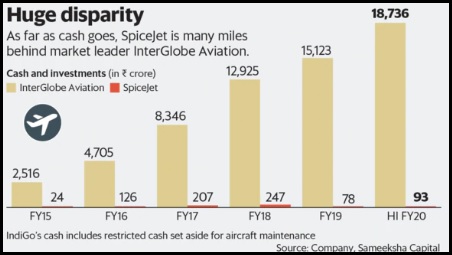For the six months ended 30 September, SpiceJet reported a loss of ₹200 crore, as the September quarter turned out to be weaker than expected.
Bhavin Shah, fund manager at Sameeksha Capital Pvt. Ltd, said SpiceJet’s free cash flow stood at ₹115 crore compared to IndiGo’s ₹3,111 crore for the first half of FY20.
An analyst at a domestic brokerage firm requesting anonymity said, “It is almost a hand-to-mouth situation for SpiceJet, and can make things tricky if the operating environment remains bad."
Shah said, “With a fundraise, SpiceJet can be in a better position to ride through rough weather. Also, it will help it get better deals from suppliers, including aircraft makers, when you are seen as financially strong."
With low cash on its books, the company is heavily dependent on variables outside its control, such as fuel prices and competitive pressures, to sustain. IndiGo, with its much higher cash holdings, can weather losses longer if things remain bad for the sector.
In general, the outlook on yields is not very robust. When Jet Airways (India) Ltd shut operations earlier this year, the aviation sector was expected to benefit greatly, especially in terms of better yield environment. However, that hasn’t panned out as per expectations. In fact, even in the current quarter, which is the stronger festival season, yields have not shown a marked improvement. One reason for that is weak demand, which is capping increases in ticket prices.
In SpiceJet’s case, the grounding of Boeing 737 MAX planes also hurt. “Restarting operations of MAX, which offers 12-15% lower fuel burn and 10% lower maintenance costs, is the key to profitability," said analysts at SBICAP Securities Ltd. SpiceJet has said the Max will likely return to service from early next year. Investors will watch that closely.
Meanwhile, the silver lining on the dark clouds is that fuel prices haven’t shot up too high.
" />
SpiceJet Ltd has denied a news report that it plans to raise ₹750 crore through a qualified institutional placement. The report in the Business Standard newspaper had said that the budget airline is talking to investors to cope with the liquidity crunch it is facing.
Whether or not the company has actually been talking to potential investors, the fact is that SpiceJet has extremely low amounts of cash on its books, and needs to bolster its balance sheet with a fundraise sooner than later.
As on 30 September, the airline had cash and cash equivalents worth ₹93 crore. What’s more it had a negative net worth of about ₹850 crore. For comparison, market leader InterGlobe Aviation Ltd had cash and cash equivalents worth about ₹18,736 crore and a net worth of about ₹6,200 crore at end of September.

InterGlobe runs IndiGo, India’s largest airline by market share.
For the six months ended 30 September, SpiceJet reported a loss of ₹200 crore, as the September quarter turned out to be weaker than expected.
Bhavin Shah, fund manager at Sameeksha Capital Pvt. Ltd, said SpiceJet’s free cash flow stood at ₹115 crore compared to IndiGo’s ₹3,111 crore for the first half of FY20.
An analyst at a domestic brokerage firm requesting anonymity said, “It is almost a hand-to-mouth situation for SpiceJet, and can make things tricky if the operating environment remains bad."
Shah said, “With a fundraise, SpiceJet can be in a better position to ride through rough weather. Also, it will help it get better deals from suppliers, including aircraft makers, when you are seen as financially strong."
With low cash on its books, the company is heavily dependent on variables outside its control, such as fuel prices and competitive pressures, to sustain. IndiGo, with its much higher cash holdings, can weather losses longer if things remain bad for the sector.
In general, the outlook on yields is not very robust. When Jet Airways (India) Ltd shut operations earlier this year, the aviation sector was expected to benefit greatly, especially in terms of better yield environment. However, that hasn’t panned out as per expectations. In fact, even in the current quarter, which is the stronger festival season, yields have not shown a marked improvement. One reason for that is weak demand, which is capping increases in ticket prices.
In SpiceJet’s case, the grounding of Boeing 737 MAX planes also hurt. “Restarting operations of MAX, which offers 12-15% lower fuel burn and 10% lower maintenance costs, is the key to profitability," said analysts at SBICAP Securities Ltd. SpiceJet has said the Max will likely return to service from early next year. Investors will watch that closely.
Meanwhile, the silver lining on the dark clouds is that fuel prices haven’t shot up too high.
0 thoughts on “With hardly any cash left SpiceJet should fuel up for the flight ahead”